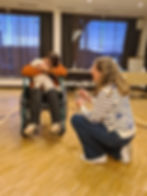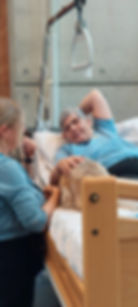
WHERE HEALING HAS A WET NOSE: PATTES TENDUES AT WORK IN GENEVA
Pattes Tendues: A Noble Alliance Between Humans and Animals
This report was authored by Noble Alliance and reviewed in collaboration with Pattes Tendues. We warmly thank Ms. Mary-Claude Pellaux, Co-President of Pattes Tendues, for her insightful review and invaluable contributions.
Since its founding in 1999, Pattes Tendues has worked in Geneva and beyond to provide comfort and companionship to individuals experiencing hospitalization or other forms of vulnerability. Through therapeutic visits conducted by trained volunteers and their animals, the association creates meaningful connections and moments of shared joy.

Therapeutic Visits
The primary objective of Pattes Tendues is to enhance patients’ quality of life by introducing therapeutic moments of joy and calm, facilitated by the presence of companion animals. Volunteers accompanied by their dogs or other household pets make regular visits to healthcare institutions, including hospitals, long-term care facilities (EMS), and institutions supporting individuals with disabilities. These interactions have been shown to encourage emotional expression, reduce anxiety, and stimulate memory in patients.

Photo courtesy of Pattes Tendues
Training and Volunteer Screening
All volunteers undergo a structured selection and training process:
Aptitude Testing: Each dog undergoes a free, individual 45-minute behavioral assessment to determine its suitability for therapeutic engagement.
Six-Day Training Program: Volunteers complete a comprehensive course, including theoretical instruction and hands-on sessions, preparing them for therapeutic visits.
Dogs between the ages of two and eight are eligible, regardless of breed, provided they are compliant with cantonal regulations and display a calm, sociable temperament.

Institutional Partners
To date, Pattes Tendues has trained several hundred human–animal teams and reached more than 55,000 individuals. The association currently operates in over 30 institutions in the Canton of Geneva, as well as in surrounding cantons. These include:
Geneva University Hospitals (HUG)
Long-term care facilities (EMS)
Institutions supporting people with disabilities
Retirement homes and assisted living centers
Visits typically last 30 to 45 minutes and are conducted under the supervision of institutional staff, ensuring a safe and structured environment. These visits provide patients with a moment of connection, emotional relief, and a sense of shared humanity.

Supporting Pattes Tendues
The association relies entirely on donor support to sustain its mission. Individuals may contribute in several ways:
Financial Donations: Contributions help fund volunteer training and support ongoing therapeutic activities.
Volunteer Participation: Owners of eligible companion animals are encouraged to apply and join the network of volunteers.
Community Awareness: Sharing information about Pattes Tendues supports public understanding and fosters broader participation.
Contact Information
Phone: +41 22 346 69 49 / +41 22 346 11 14
Website: pattestendues.org
Postal Account: 17-518220-9 (IBAN CH45 0900 0000 1751 8220 9)
Visiting Dogs in Clinical Settings: An Emerging Therapeutic Modality

In hospital environments, where anxiety, pain, and isolation are often pervasive, the presence of visiting dogs offers measurable emotional support. Recent studies indicate that contact with dogs can reduce stress and anxiety levels, while increasing endorphin release. Beetz et al. (2012) demonstrated that animal-assisted interactions elevate oxytocin levels—an attachment-related hormone—contributing to psychological comfort and diminished stress in hospitalized patients.
Therapeutic visits benefit patients in diverse settings, including rehabilitation, palliative care, and chronic disease treatment. The dogs provide nonjudgmental companionship and emotional respite. In patients with dementia, Marcus and Gantt (2012) observed improved mood and reduced anxiety, with enhanced interpersonal interactions and a stronger sense of safety.
Beyond emotional comfort, these animals play a therapeutic role in recovery. The presence of dogs encourages communication, even in patients who struggle with verbal expression. Chandler (2017) notes that animals foster a healing environment by supporting patients’ mental health and reducing feelings of isolation. Dogs often help facilitate trust between patients and healthcare teams, contributing to more compassionate care. Lundqvist and Carlsson (2013) further found that therapeutic animals promote a more positive atmosphere conducive to recovery.
Program Integrity and Broader Impact

Photo courtesy of Pattes Tendues
Visiting dogs are not chosen casually. They undergo rigorous behavioral assessment and are integrated into structured programs managed by specialized associations. These dogs are accompanied by trained volunteers who ensure that patient–animal interactions are both therapeutic and secure. Notably, the positive impact of these animals extends beyond patients to healthcare personnel. Staff members, frequently operating under stressful conditions, benefit from brief moments of interaction with animals, which may help reduce tension and promote workplace well-being. In fostering a more relaxed and emotionally attuned environment, visiting animals indirectly support better patient care.
Noble Alliance, is committed to advancing the human–animal bond and to raising awareness of organizations such as Pattes Tendues. The presence of visiting dogs is a growing evidence-based practice with clear benefits for patients and caregivers alike. We hope to see wider adoption of these therapeutic visits in healthcare settings throughout Switzerland.
Pattes Tendues : une noble alliance entre humains et animaux
Ce rapport a été rédigé par Noble Alliance et relu en collaboration avec Pattes Tendues. Nous exprimons notre profonde gratitude à Mme Mary-Claude Pellaux, coprésidente de Pattes Tendues, pour sa relecture attentive et ses contributions précieuses.
Depuis sa création en 1999, l’association Pattes Tendues agit à Genève et au-delà pour offrir réconfort et présence aux personnes hospitalisées ou en situation de vulnérabilité. Par le biais de visites thérapeutiques menées par des bénévoles formés et accompagnés de leurs animaux, l’association crée des liens porteurs de sens et des instants de joie partagée.
Visites thérapeutiques
L’objectif principal de Pattes Tendues est d’améliorer la qualité de vie des patients en introduisant des moments de calme et de joie, rendus possibles par la présence d’animaux de compagnie. Les bénévoles, accompagnés de leur chien de thérapie ou d’un autre animal domestique, effectuent des visites régulières au sein d’établissements de santé, notamment les hôpitaux, les établissements médico-sociaux (EMS) et les institutions accueillant des personnes en situation de handicap. Ces interactions favorisent l’expression émotionnelle, réduisent l’anxiété et stimulent la mémoire des patients.
Formation et sélection des bénévoles
Tous les bénévoles suivent un processus structuré de sélection et de formation :
Évaluation comportementale : chaque chien de thérapie est soumis à un test individuel gratuit de 45 minutes afin d’évaluer son aptitude à exercer cette activité.
Programme de formation : les bénévoles participent à un cursus complet de six jours, combinant théorie et pratique, les préparant aux visites thérapeutiques.
Les chiens doivent être âgés de deux à huit ans, sans distinction de race, à condition qu’ils soient conformes aux réglementations cantonales et qu’ils présentent un tempérament calme et sociable.
Partenariats institutionnels
À ce jour, Pattes Tendues a formé plusieurs centaines de duos humain–animal et a touché plus de 55,000 personnes. L’association est active dans plus de 30 établissements du canton de Genève, ainsi que dans des cantons voisins. Parmi ces institutions figurent :
Les Hôpitaux Universitaires de Genève (HUG)
Les établissements médico-sociaux (EMS)
Les institutions pour personnes en situation de handicap
Les maisons de retraite et structures de logement accompagné
Les visites durent généralement entre 30 et 45 minutes et sont encadrées par le personnel des établissements, garantissant ainsi un environnement sûr et structuré. Ces moments apportent aux patients une connexion, un soulagement émotionnel et un sentiment d’humanité partagée.
Soutenir Pattes Tendues
L’association fonctionne exclusivement grâce aux dons. Il est possible de contribuer de plusieurs manières :
Dons financiers : ils permettent de financer la formation des bénévoles et de soutenir les activités thérapeutiques.
Engagement bénévole : les propriétaires d’animaux de compagnie remplissant les critères sont invités à rejoindre le réseau.
Sensibilisation du public : faire connaître Pattes Tendues, c’est renforcer l’adhésion collective à cette démarche.
Coordonnées
Téléphone : +41 22 346 69 49 / +41 22 346 11 14
Site internet : www.pattestendues.org
Compte postal : 17-518220-9 (IBAN CH45 0900 0000 1751 8220 9)
Le chien de thérapie en milieu clinique : une modalité thérapeutique émergente
Dans les environnements hospitaliers, où l’anxiété, la douleur et l’isolement sont fréquents, la présence d’un chien de thérapie apporte un soutien émotionnel mesurable. Des études récentes indiquent que le contact avec un animal permet de réduire le stress et l’anxiété tout en stimulant la libération d’endorphines. Beetz et al. (2012) ont démontré que les interactions assistées par l’animal augmentent le taux d’ocytocine – une hormone liée à l’attachement – contribuant ainsi au réconfort psychologique et à la diminution du stress chez les patients hospitalisés.
Les visites thérapeutiques bénéficient à des patients dans des contextes variés : rééducation, soins palliatifs, pathologies chroniques. Les chiens offrent une présence non jugeante et un répit émotionnel. Chez les personnes atteintes de démence, Marcus et Gantt (2012) ont observé une amélioration de l’humeur et une réduction de l’anxiété, associées à des interactions accrues et à un sentiment de sécurité renforcé.
Au-delà du réconfort émotionnel, ces animaux jouent un rôle thérapeutique dans le processus de rétablissement. Leur présence favorise la communication, y compris chez les patients ayant des difficultés d’expression verbale. Chandler (2017) souligne que les animaux soutiennent la santé mentale des patients en réduisant leur isolement. Ils facilitent également la relation de confiance entre patients et soignants, participant à une prise en charge plus humaine. Lundqvist et Carlsson (2013) ont par ailleurs montré que la présence d’animaux thérapeutiques contribue à instaurer une atmosphère propice au rétablissement.
Qualité du programme et impact élargi
Les chiens de thérapie ne sont pas choisis au hasard. Ils font l’objet d’une évaluation comportementale rigoureuse et sont intégrés dans des programmes encadrés par des associations spécialisées. Ces chiens sont accompagnés de bénévoles formés, qui veillent à la sécurité et à la dimension thérapeutique des interactions.
L’impact positif de ces visites dépasse d’ailleurs le seul cadre des patients. Les professionnels de santé, souvent soumis à un stress important, bénéficient également de ces brefs moments de contact animal, qui peuvent atténuer les tensions et favoriser un mieux-être au travail. En contribuant à un climat émotionnel plus serein, les chiens de thérapie participent indirectement à l’amélioration des soins.
Noble Alliance s'engage à faire progresser le lien humain–animal et à promouvoir la visibilité des structures extraordinaires comme Pattes Tendues. La présence d’un chien de thérapie n’est pas un simple réconfort : elle constitue une pratique fondée sur des données probantes, aux bénéfices clairs pour les patients comme pour les soignants. Nous espérons voir ce modèle thérapeutique se déployer plus largement dans les établissements de santé en Suisse.
Related Images















